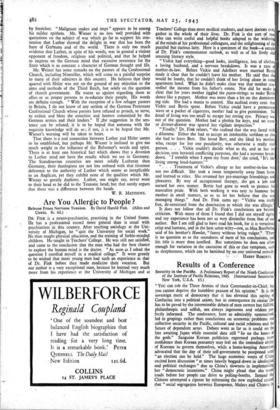Are You Allergic to People ?
Release From Nervous Tension. By David Harold Fink. (Allen and Unwin. 8s. 6d.) .
DR. FINK is a neuro-psychiatrist, practising in the United States. He has a professional record more general than is usual with psychiatrists in this country. After teaching sociology at the Uni- versity of Michigan, he " quit the University for social work." He then taught physical education, and the training of feeble-minded children. He taught in Teachers' College. , He was still not satisfied, and came to the conclusion that the man who had the best chance to explore the human mind is the doctor. " As soon as I asked the question I enrolled myself in a medical college." It were greatly to be wished that more young men had such an experience as that of Dr. Fink before they made medicine their vocation. But our author is a very exceptional man, because he learned very much more from his experience at the University of Michigan and at
Teachers' College than most medical students, and most doctors even, gather in the whole of their lives. Dr. Fink is the sort of man who can write useful and helpful books adapted to the widening of the minds of his professional colleagues, and the enlightening of the puzzled but curious laity. Here is a specimen of the book—a sample of Dr. Fink's commonsense outlook, as well as of his lively and amusing literary style.
" Vickie had everything—good looks, intelligence, lots of clothe a loving husband, and a nervous breakdown. It was a case mother-in-law. Before Vickie and Adelbert were married Bertie made it clear that he couldn't leave his mother. He said that she would be lonely, that he couldn't think of her living alone in some apartment hoteL What he didn't make clear was that mother con- trolled the income from his father's estate. Nor did he make it clear that for years mother jiggled the purse-strings to make Berrie dance like a puppet. Mother was more than a bit on the domineer. ing side. She had a mania to control. She audited every cent. that Vickie and Bertie spent. Before Vickie could have a permanent wave or a packet of cigarettes, mother had to give permission. No detail of living was too small to escape her roving eye. Privacy was out of the question. Mother had a phobia for keys, and no room or dresser-drawer was spared her vigilant inspection."
" Finally," Dr. Fink relates, " she realised that she was faced with a dilemma. Either she had to accept an intolerable serfdom or else she had to leave Bert. She loved Bert, and she liked his mother, who, except for her one peculiarity, was otherwise a really nice
person. . . Vickie couldn't decide what to do, and in her in- decision, torn between conflicting purposes, she had a nervous break- down. ' I tremble when I open my front door,' she cried, ' It's like living among head-hunters.' " ti . . . Treatment of Vickie's allergy to her mother-in-law was not too difficult. She took a room temporarily away from home and learned to relax. She resumed her pre-marriage friendships and pleasures. By way of occupational therapy, she got a job and earned her own money. Bertie had gone to work to protect his
masculine pride. With both working it was easy to humour h mother in small matters, so as to let her believe that she w managing things." And Dr. Fink sums up: " Vickie was real free, de-sensitised from the domination to which she was allergic.
It does not follow that all Dr. Fink's conclusions are beyo criticism. With many of them I found that I did not myself agree and my experience has been not so very dissimilar from that of out author. But I am still glad to have read his book, for it is veracious, crisp and humane, and in the best sense witty—not, as Max Beerbohm said of his brother's Hamlet, "funny without being vulgar." There is no question as to the soundness of most of his conclusions, and his title is more than justified. But sometimes he does not allow enough for variation in the causation of this or that symptom, such as sleeplessness, which can be banished by no one universal remedy.
HARRY ROBERTS.


























 Previous page
Previous page